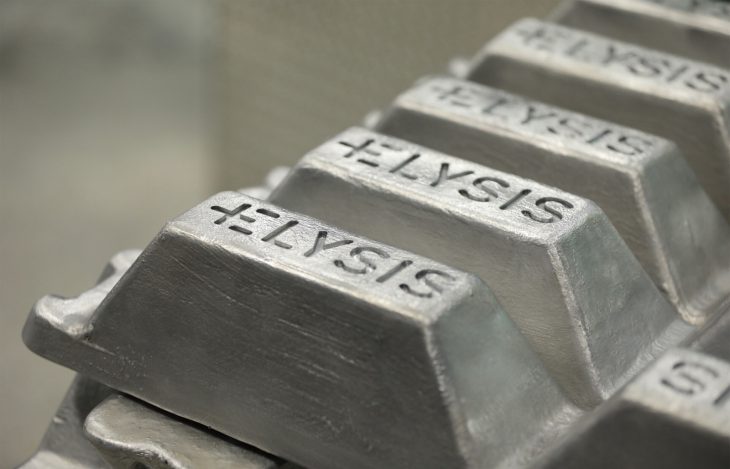Elysis, the joint venture between Alcoa and Rio Tinto, announced that is has successfully produced the first commercial batch of aluminum without any direct carbon dioxide emissions at the Alcoa Technical Center (ATC) in Pittsburgh, PA — using a breakthrough, carbon-free smelting technology. The first purchase of the aluminum was made by Apple — a major milestone for Elysis.
“This sale is an important milestone for Elysis and a sign of our progress over our first year of operation,” said Vincent Christ, president and CEO of Elysis. “It confirms the market interest in aluminium produced using our breakthrough carbon free smelting technology. We are continuing to progress further development of our technology, with our focus on bringing it to market to revolutionize the industry.”
Alf Barrios, chief executive of Rio Tinto Aluminium, added, “Rio Tinto is proud to help deliver through our commercial network the sale of the industry’s first aluminium produced using carbon free smelting technology. This is another important step towards zero carbon aluminum and a more sustainable future.”
New Research Center
The Elysis technology, first announced in 2018, essentially replaces carbon-based anodes (which produce CO2 and other harmful emissions) with proprietary materials that produce only oxygen as a byproduct. If fully implemented at existing aluminum smelters in Canada, the technology could eliminate the equivalent of 6.5 million metric tonnes of greenhouse gas emissions. It is also expected to reduce operating costs when compared to the traditional smelting process.
Elysis is actively working towards ramping up its process to a commercial scale. Formed in 2018, the company currently has 80 people working worldwide, including those at the company’s Montrea, Canada headquarters, Alcoa’s Technical Center in Pittsburgh, and Rio Tinto’s technology design facilities in France.
Those experts will soon be joined by 25 new employees at the Elysis Saguenay Research and Development Center, where construction work began in August and is currently on schedule. The CA$50 million construction project is expected to be fully operational in the second half of 2020 and will be located at Rio Tinto’s Jonquière complex, the site of the Arvida smelter, Arvida Research and Development Center, and Vaudreuil aluminum refinery.
Apple’s Commitment

Apple uses aluminum for the housings of a number of its products, including the iPhone, Apple Watches, and Mac computers. As part of Apple’s commitment to reducing the environmental impact of its products, the company introduced its new MacBook Air and Mac mini, which are comprised of 100% recycled aluminum last year.
The company is continuing its pursuit of sustainability through innovation in the aluminum smelting sector. Apple helped accelerate the development of the Elysis technology — partnering with both aluminum companies and the governments of Canada and Quebec to collectively invest a combined $144 million to future research and development.
As a founding investor, Apple continues to provide technical support to Elysis and intends to make additional purchases over the course of the technology’s development. This first sale delivered through Rio Tinto’s commercial network demonstrates the market potential for aluminum made using Elysis’ technology, as the demand for environmentally sustainable products grows.
“For more than 130 years, aluminum — a material common to so many products consumers use daily — has been produced the same way,” said Lisa Jackson, vice president of Environment, Policy, and Social Initiatives at Apple. “That’s about to change. Bringing this revolutionary technology to market is part of Apple’s commitment to a clean energy future, one where the best products for our customers are also the best for the planet. We’re thrilled to be partnering with Rio Tinto, Alcoa, and Elysis on this breakthrough, and driving changes to how the world produces aluminum for the better.”

